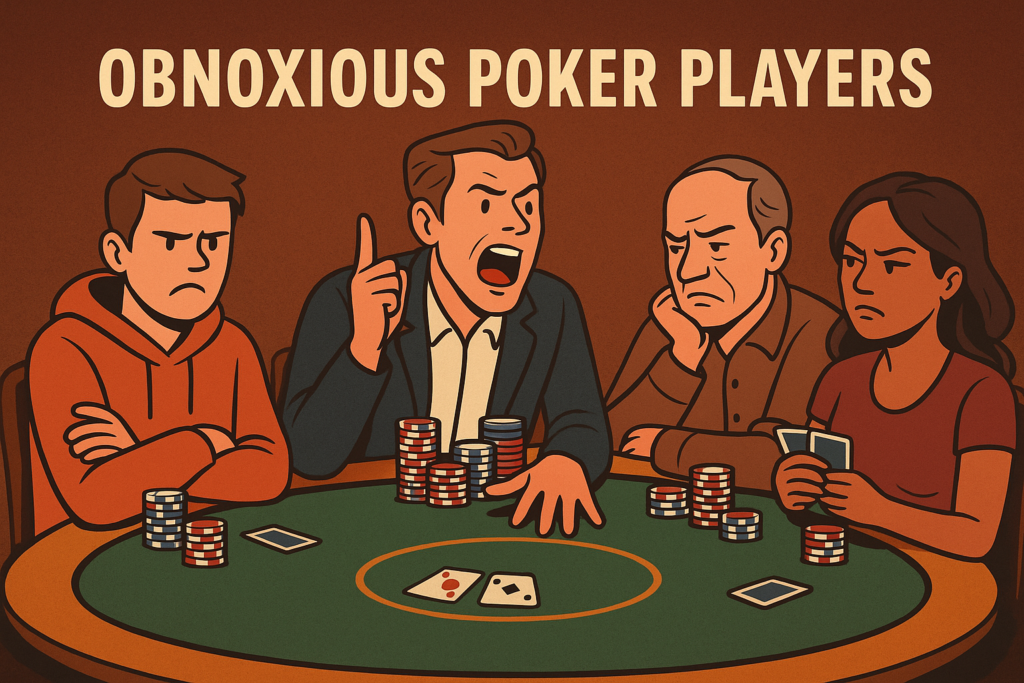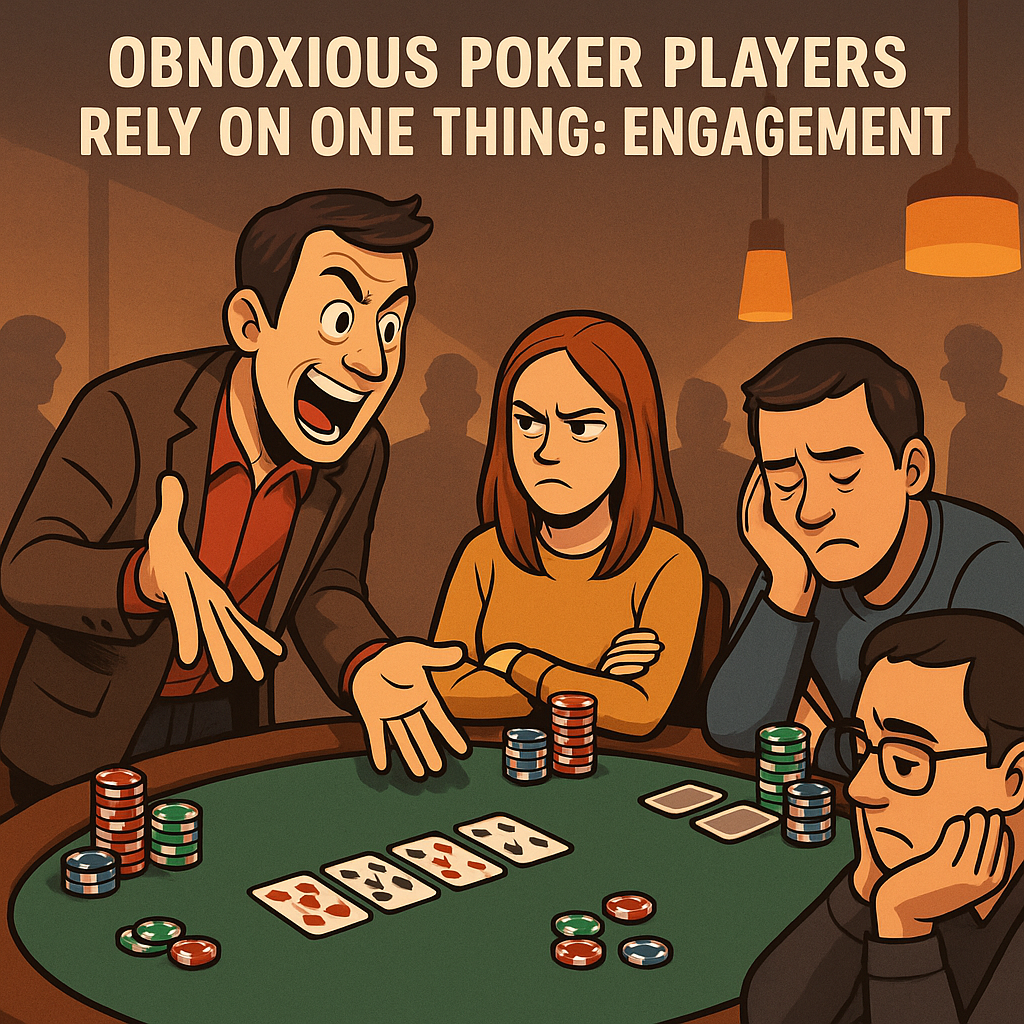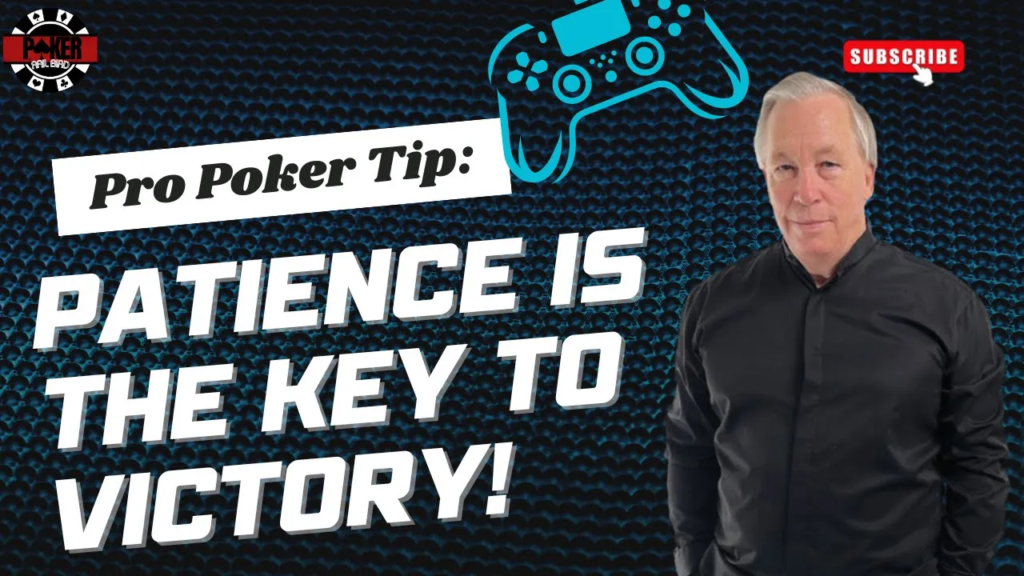OBNOXIOUS POKER PLAYERS
HOW TO SPOT THEM, BEAT THEM & STAY SANE AT THE TABLE
Obnoxious poker players can ruin the flow of a game, push your patience to the brink, and even cost you money—if you let them. These players talk too much, criticize everyone else’s play, and act like the table is their personal stage. Whether it’s trash talk, ego-driven rants, or relentless needling, their antics aren’t just annoying—they’re strategic distractions.
And make no mistake: they want you off balance.
Some players thrive on disruption. They bait, provoke, and agitate not because it’s fun—but because it works. For the unprepared, these players are tilt traps with chips.

In this article, we’ll break down exactly what makes these personalities tick, how to spot them fast, and most importantly—how to stay in control and play your best game no matter how loud things get. We’ll also look at one real-world example of ego-fueled disaster, and explain how you can use obnoxious poker players’ behavior against them.
Let’s start by digging into the psychology behind the noise.
THE PSYCHOLOGY OF OBNOXIOUS PLAYERS
Obnoxious poker players don’t act out by accident. Their behavior is usually driven by a cocktail of insecurity, ego, and the desire for control. Most of the time, they’re not just trying to entertain themselves—they’re trying to throw you off your game.
At the heart of it, these players want attention. They want control. They want to be perceived as dominant—even if their play doesn’t back it up.
Some are classic narcissists who believe they’re the smartest person at the table. Others are deeply insecure and use noise as a defense mechanism. A few are just bored and want to liven up the game, even if it means irritating everyone else in the process.
Here’s the real danger: when you respond, they win. The moment you shift from calculating pot odds to calculating comebacks, you’re already off balance. Obnoxious players thrive on this. Their goal is to shift the dynamic from poker to ego—and the longer you let them bait you, the more profitable you become – for them!
Before we dive into how they behave, let’s pause and look deeper at what drives them psychologically.
.
SIDEBAR: WHAT MAKES THEM TICK-THE PSYCHOLOGY BEHIND OBNOXIOUS POKER PLAYERS
Obnoxious poker players aren’t just irritating—they’re often revealing far more than they realize. When you understand the psychology behind their behavior, you gain a powerful edge. Here are four common traits that drive the most disruptive players—and how to use each one to your advantage.
NARCISSISM
LOW EMOTIONAL INTELLIGENCE (EQ)
These players crave attention and admiration. They believe they’re the smartest person in the room—and want everyone to know it. Narcissistic players often overtalk, correct others’ play, and react poorly to being challenged.
At the table:
They dominate conversation, belittle decisions, and insert themselves into pots just to showcase “how well” they understand the game. Their arrogance blinds them to risk, variance, and actual skill gaps.
How to exploit it:
Let them talk. Don’t challenge their ego—just observe. When they suddenly go silent during a hand, that shift is often more honest than their words. Their need for control makes their betting patterns more readable than they realize.
Players with low EQ lack the ability to read others, manage their emotions, or recognize the impact of their own behavior. They often blurt out things at the wrong time and act without considering how they’re perceived.
At the table:
They’re erratic. They tilt fast, talk louder when frustrated, and double down on bad behavior. Their inability to self-regulate makes them highly volatile players—sometimes hyper-aggressive, other times passive and reactive.
How to exploit it:
Play steady, emotionless poker. Let them unravel. You’ll often see them chase weak draws, overbet top pair, or bluff in spots where it makes no sense—because they’re not thinking about you, they’re reacting to themselves.
EGO FRAGILITY/INSECURITY
NEED FOR CONTROL
Ironically, some of the loudest players are the most fragile. They use table talk, bravado, and aggression to mask fear—fear of losing, fear of being exposed, or fear of being “shown up.”
At the table:
They pick fights, over-celebrate small wins, and lash out when things don’t go their way. Their sense of identity is tied to being perceived as a “great player,” so they spiral when they feel disrespected.
How to exploit it:
Don’t feed their need for validation. Just keep stacking chips and staying silent. A single well-timed check-raise or disguised trap can send them into emotional chaos. Their need to reclaim “alpha status” often leads to disaster.
These players aren’t just chatty—they’re manipulative. They talk not to connect, but to control the table’s energy and pace. They use conversation to set tempo, unsettle opponents, and dominate the psychological flow.
At the table:
They’ll stall when losing, speed up when winning, needle weak players, and bait confident ones. Control players love putting others on the defensive.
How to exploit it:
Flip the script. Be unpredictable in tempo but stable in decision-making. Stay calm when they accelerate, and play methodically when they try to stall. The more you resist their control, the more they lose grip—and eventually, chips.
.
🎯 Bottom line? These players reveal more through their behavior than they’d ever admit. Use their psychology not just to tolerate them—but to beat them, and above all, never engage them.
COMMON TRAITS OF OBNOXIOUS POKER PLAYERS
Obnoxious poker players come in many forms—loudmouths, showboats, know-it-alls, needlers—but most share the same underlying goal: disrupt the game to gain an edge. Some do it intentionally, others can’t help themselves. Either way, spotting the signals early can protect your stack and your focus.
Here are the most common red flags:
EXCESSIVE TABLE TALK
They talk every hand, every street, every moment between. Sometimes it’s poker advice no one asked for. Sometimes it’s commentary, jokes, or irrelevant stories. The goal? Control the rhythm and distract opponents.
🎯 Watch for: A sudden shift from chatter to silence mid‑hand—it often signals a strong holding.

🎥 Real Example – William Kassouf:
William Kassouf, recently banned from the 2025 WSOP after a string of clock violations, verbal outbursts, and stalling tactics during the Main Event, is the poster child for excessive speech play. In mid‑July, WSOP officials officially banned him from further events after he ignored repeated warnings, argued with tournament directors, and threatened fellow players before being escorted out by security . His style pushes the line—but when his chatter stops mid‑hand, that shift is often the clearest signal of all.
Key lesson: The more they talk, the more you should observe. Their mouth is rarely as dangerous as their hand.
CRITIQUING OTHER PLAYER'S HANDS
TRASH TALK & VERBAL NEEDLING
FAKE FRIENDLINESS OR FORCED CHARM
OVERRACTING AFTER WINS OR LOSSES
They love telling others what they “should have done,” especially after a hand has ended. It’s about ego, not education—and it creates tension at the table.
🎯 Strategic tip: Let them coach everyone into playing poorly. Meanwhile, focus on extracting value.
From sarcastic jabs to passive-aggressive comments, obnoxious players often look for emotional pressure points. They’re trying to put others on tilt.
🎯 Stay neutral. Don’t respond, don’t defend your decisions. Let them bark while you bite.
Some obnoxious players mask their aggression behind fake warmth. They laugh loudly, over-congratulate others, or pretend to bond—until they have a reason to strike.
🎯 Don’t fall for it. If their friendliness flips the moment they lose a pot, it was never real.
Whether they’re fist-pumping after winning a $15 pot or blaming the dealer after a loss, these players thrive on drama. It’s a performance—and you’re the audience they’re trying to provoke.
🎯 Best move? Stay stone-faced. You don’t need to play their game. You just need to play poker.
If these behaviors seem familiar, that’s because they’re everywhere. Low-stakes, mid-stakes, online or live—obnoxious poker players show up like clockwork. Your edge comes from not joining the show.
CASE STUDY: SEAT 7 VS SEAT 2
THE HAND THAT COST HIM ALL HIS CHIPS
Let’s take this out of theory and into real life. I was in a $1/$3 no-cap cash game recently that played more like a wild $5/$10. The table was loud, aggressive, and ego-driven from the moment I sat down.
Seat 7 was your classic obnoxious poker player: nonstop talker, self-proclaimed expert, and relentless needler. He claimed he could read everyone’s body language, said he had “every pattern down,” and had probably narrated every pot since he arrived. I paid him no attention—but not everyone else was so disciplined.
Eventually, Seat 2 took the bait.
He started arguing with Seat 7—challenging his analysis, pushing back on his opinions, escalating the verbal exchange. Ego had now met ego, and the real poker stopped while the performance began.
Seat 7 had about $900 behind and seat 2 sat with $600.
- Preflop: Seat 7 opened to $45. Everyone folded to Seat 2, who called.
- Flop: 8♥ 10♥ J♣. Pot: $94
Seat 7 immediately fired $120. Seat 2 snap-called. - Turn: 3♥ (flush and straight both now possible). Pot: $334
Now Seat 7 bet $250. Seat 2 called again, leaving himself just $200 behind. - River: 8♠ (pairs the board). Final pot: $834
Seat 7 shoved all in. Seat 2 tanked, still talking. After about 30 seconds, he called.
Seat 7 turned over K♥ Q♥ for a king-high flush and seat 2 mucked quietly. He never showed, but based on the board and his reaction, he likely had top pair—or worse.
THE REAL PROBLEM
Seat 2 didn’t lose this hand because of the cards. He lost it because his ego locked him into a battle with someone he should have ignored. Once he took the bait, he wasn’t playing poker anymore—he was playing pride.
And make no mistake: this kind of behavior is overwhelmingly male. In over 30 years of live play, I’ve encountered hundreds of obnoxious poker players—and I can’t recall a single one who was female. Same with poker bullies. Maybe they’re out there, but I’ve never seen it.
Seat 7 was exactly that kind of player—loud, condescending, and emotionally manipulative. Seat 2 met him head-on, trying to out-talk and out-tough him. In doing so, he stopped thinking. He stopped analyzing. He just called his way into disaster, likely out of spite or embarrassment.
🎯 Takeaway: Don’t let obnoxious poker players bait you into irrational decisions. They want you emotionally committed. Stay detached, and let their behavior become part of your edge—not your downfall.
HOW TO HANDLE OBNOXIOUS POKER PLAYERS

You can’t change them—but you can outplay them.
Obnoxious poker players rely on one thing: engagement. They want your attention, your frustration, your reaction. They want to pull you off your A-game and into theirs. The most powerful weapon you have isn’t aggression or clever comebacks—it’s silence and discipline.
Here’s how to keep your edge:
DON'T ENGAGE - EVER
WATCH THEM CLOSELY-BUT QUIETLY
LET THEM TILT THEMSELVES
No witty retorts, or eye rolls. No sighs. The moment you respond, you validate their behavior. They’re feeding on your emotional energy. Don’t give them a single calorie.
🎯 Silence is your superpower. Be unreadable. Be boring
They often give away strength and weakness in predictable patterns. For example:
They talk more when bluffing
Often they go quiet when strong
They force banter preflop to manipulate postflop dynamics
🎯 Pattern recognition turns their noise into your information.
Obnoxious players often implode on their own. They fire too many barrels, bluff too many rivers, and lose track of pot control. Their ego doesn’t allow them to slow down—until it’s too late.
🎯 Patience beats provocation. Wait them out, then strike clean.
SEPARATE THE ACT FROM THE MATH
KNOW WHEN IT'S NOT WORTH IT
Theatrics mean nothing. You still need to make technically sound decisions. Pot odds, ranges, board texture, position—all of that still matters. Ignore the circus and focus on the numbers.
🎯 When in doubt, fall back on fundamentals. Emotion has no edge.
If a player is truly disrupting your focus or momentum—and you’re struggling to play your best—ask for a table change. There’s no shame in protecting your edge.
🎯 Your job is to win chips—not prove a point.
Obnoxious poker players aren’t unbeatable. In fact, once you stop reacting, they become easier to beat than most. Stay calm. Stay sharp. Let them drown in their own noise while you quietly count their chips.
FINAL THOUGHTS: SILENCE WINS, EGO PAYS
Obnoxious poker players are a part of the game. You’ll find them in every cardroom, every limit, every city. Some are loudmouths. Others are manipulators. A few are flat-out bullies. But almost all of them have one thing in common: they want you to lose your composure.
And if you do, they win—whether they have the best hand or not.
But if you stay patient, disciplined, and emotionally neutral, something magical happens. Their behavior becomes predictable. Their need for control becomes a tell. And their ego becomes your profit center.
Remember this:
- Don’t engage.
- Don’t respond.
- Don’t try to out-talk them.
- Just observe, adapt, and wait for your spot.
Because the truth is, obnoxious poker players almost always self-destruct. Your job isn’t to fight them—it’s to let them do what they do best: overplay, overtalk, and overcommit. And when the time is right?
🎯 You scoop the pot, say nothing… and move on.


